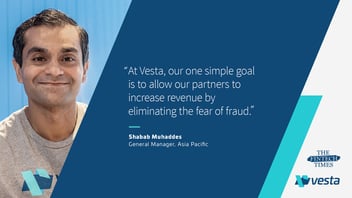How can merchants fight ecommerce fraud amid a time of continuous change – Exclusive interview with Vesta
Could you start by giving our readers a short introduction of yourself and Vesta?
Vesta is a fintech pioneer in fraud protection and fully guaranteed payment technologies. We’ve been serving the industry for over 25 years now, and while we are no doubt a payments industry veteran, we are unique in that we maintain a technology and product development focus and growth mentality more similar to a fintech startup.
Our biggest differentiator is the real-time decisioning platform we’ve built, which utilizes data science and machine learning, and incorporates more than 25 years of intelligence. Our technology is truly industry agnostic – be it supporting our telecommunications customers or any number of online merchant or channel partners, from payment service providers, prepaid cards and eGifts, to eTickets and in-game purchasing.
In essence, we analyse customers’ online payment transactions to assess the risk of fraud. When a payment is made online, a merchant has to apply technology to determine if it should be accepted. Not all transactions are accepted, but Vesta’s ML intelligence ensures good transactions are rightfully accepted rather than rejected for fear of fraud. Relying on our fraud mitigation solution, backed by a zero-fraud-liability guarantee, our customers can take their 60% approval rates to upwards of 90 or 95%, which brings increased revenue and ultimately profits.
As for me, I feel very privileged to work with a great team of people here at Vesta. I came in as CEO in 2019, and my background includes leadership roles at a variety of established and startup fintech companies. I am looking forward to scaling this company to reach its highest potential – and help our customers to reach theirs through our solutions.
What can you tell us about the current state of ecommerce fraud? How has ecommerce fraud developed over the past years, and what has been the response to these changes by merchants?
Ecommerce purchasing is at an all-time high, but so is fraud. There has been a dramatic increase in retail fraud attempts for card-not-present transactions with the surge in e- and mcommerce in recent years, and especially over the past 3-4 months, as businesses of all stripes have embraced contactless payments. Some researchers are expecting retailers will lose about USD 130 billion in revenue due to CNP fraud between now and 2023.
The rising fraud risk seems daunting for many merchants, which leads them to respond in one of two ways – by investing heavily in set-and-forget (often expensive) fraud prevention technology or rejecting any transaction that seems questionable.
Often, the result is they wind up over-spending on fraud tools – about USD 4 is spent for every USD 1 of actual fraud committed – and overly-tightening acceptance parameters, resulting in an even greater cost in lost opportunity. False-positive declines cost the retail sector around USD 118 billion in lost sales, annually. Add to that the fact that customers who are declined by a retailer typically take their business elsewhere and never return, and these fraud prevention methods could pose a greater risk to revenues than fraud itself.
Can you share with us some of the ways that the current pandemic has impacted the ecommerce industry?
Ecommerce has of course seen a dramatic increase over the past few months as more people seek safe ways to shop and pay amid the pandemic, and unfortunately fraud increases are in lockstep. At Vesta, keeping merchants and consumers safe online has never been more important.
Any time our partners serve a consumer in an online or mobile channel, that is where we are or want to be, ready to validate those transactions, to reduce fraud, increase approvals, and enable merchants to fearlessly conduct cross-border commerce with our zero-fraud guarantee. For many small to medium sized businesses – some struggling to stay afloat and some trying to keep up with differentiation, channel expansion, and reduced workforce stressors – online has been the sole source of revenue during the pandemic, so every transaction counts. Our aim is to remove the stressors of fraud decisioning and open up otherwise lost revenue to businesses through the duration of this global crisis and beyond.
Taking all these developments into account, how do you advise merchants to approach fighting fraud in the current ecosystem?
From what I have seen across the industry and from conversations I have had over the past several years, businesses need to change how they think about fraud.
Many businesses hold to the unrealistic goal of achieving zero fraud. There is one easy way to accomplish that: decline all transactions. But if a retailer intends to build a profitable business, fraud avoidance must be balanced with increasing customer numbers and revenue. Fraud prevention cannot come at the cost of suppressing revenue and alienating potential customers. Adjusting to track approval rates as well as fraud rates is a first step in the right direction.
Also, many people think in terms of fraud detection, rather than fraud recognition. Fraud recognition involves building deep learning capabilities that allow a system to learn and analyse, the way a human would, to determine whether a transaction is suspicious. Rather than overly tightening acceptance parameters or choosing a set-and-forget fraud fighting tool, effective anti-fraud systems must be given the flexibility to learn and adapt to new fraud vectors – this is the key to fraud protection and revenue generation.
Read the full interview here.
.png)
.png)
%20(1).png)



